Go ethnic this summer!
It's only natural to desire the exotic flavors, cooling effects and health benefits of spicy ethnic food when the weather gets hot. Thrill your palate, perspire profusely, and feel healthy from the inside out by enjoying Thai, Indonesian, Indian, Nepalese or Uzbek cuisine this summer!
 Ayung Teras
Indonesian near Shibuya Station
Ayung Teras
Indonesian near Shibuya Station
 Nepalico Komazawa
Authentic Nepalese
Nepalico Komazawa
Authentic Nepalese
 Nirvana New York Tokyo Midtown
Rebirth of a legend
Nirvana New York Tokyo Midtown
Rebirth of a legend
 Celadon
Certified Thai Select
Celadon
Certified Thai Select
Ayung Terasアユンテラス
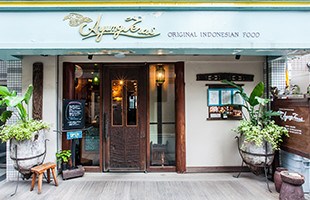
Phone: 03-5458-9099
- Address:
- 102 Le quartier, 20-12 Sakuragaoka-cho, Shibuya-ku, Tokyo
- Open:
- Lunch 11:30 am - 3:30 pm (L.O. 3:00 pm) / Dinner 6:00 pm - 11:00 pm (L.O. 10:30 pm)
- Closed:
- Summertime, Year-end
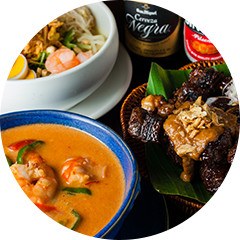 What is Indonesian cuisine?
What is Indonesian cuisine?
What is Indonesian cuisine?
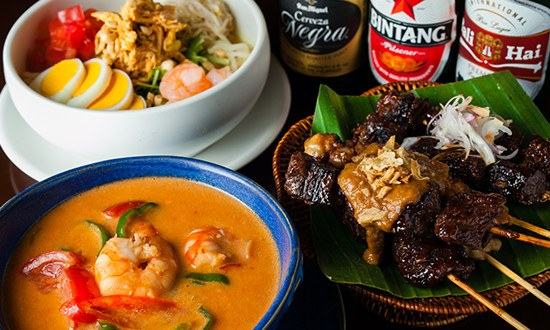
Indonesian cuisine features diverse spices and herbs, yet the flavors are relatively mild. Skewered meats soaked in saté sauce, fragrantly sautéed and topped with peanut sauce are especially popular in Japan. Placing Indonesian beer in one hand and freshly grilled saté in the other is a sure way to mentally escape to the tropics.
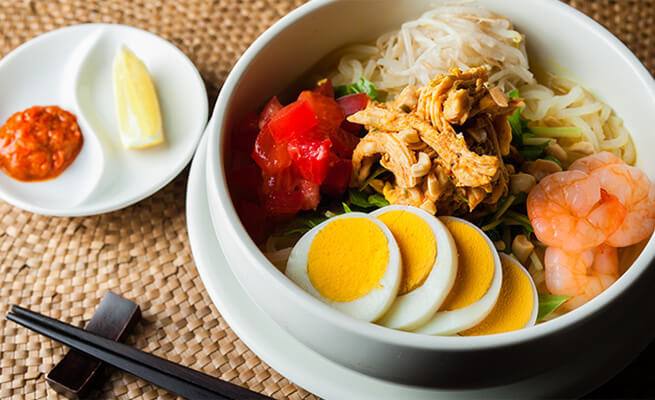
Indonesian chilled soba with chicken or shrimp is available throughout the summer. The refreshing, spicy taste stimulates your appetite.
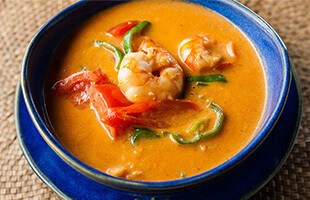
Shrimp coconut cream stew goes well with rice and is recommended in hot weather when your appetite wanes.

Tropical cocktails include Ayung Teras (right), a blend of mango and guava juice crowned with red wine.
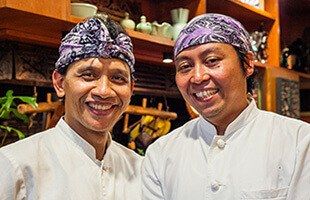
Indonesian kitchen staff I Kattou Gotora and I Koman Eka (left to right) are all smiles.
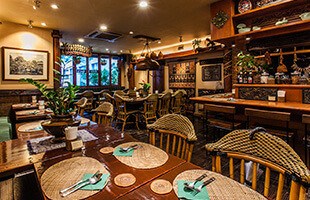
Balinese furniture and greenery contribute to a tropical atmosphere that appeals to the mainly female clientele.
Indonesian near Shibuya Station
Your first spoonful of shrimp coconut cream soup reveals a mellow blend of coconut sweetness and sour tomato. Those unfamiliar with Indonesian cuisine may expect the gentle flavor to simply fade away, but a savory complexity emerges from the sambal (chili sauce) as you chew the tender shrimp.
The simmered rendang sapi beef stew similarly reveals flavors in stages. Your palate first senses the sweetness of mellow coconut milk, then gradually comes to recognize the zesty kaffir lime, lemongrass and galangar (Thai ginger).
"Fresh spices play a central role in Indonesian cuisine, but they don't make the food hot," claims kitchen manager I Kattou Gotora. Instead, they extract the piquant flavor of the ingredients and stimulate your appetite.
The owner of Ayung Teras lived in Bali for many years and brought the tastes of authentic Indonesian cuisine to Shibuya 17 years ago when the restaurant was launched. To deliver the genuine local flavors of Indonesia in Japan, chef Kattou skillfully procures hard-to-find seasonings from Indonesia and adds plenty of fresh herbs.
Ayung Teras is one of Tokyo's more well-established ethnic restaurants and can be relied upon to deliver the diverse flavors of Indonesia with a trace of Balinese style. This time-tested recipe has earned the restaurant a solid following in the Shibuya area.

Phone: 03-5458-9099
- Address:
- 102 Le quartier, 20-12 Sakuragaoka-cho, Shibuya-ku, Tokyo
- Open:
- Lunch 11:30 am - 3:30 pm (L.O. 3:00 pm) / Dinner 6:00 pm - 11:00 pm (L.O. 10:30 pm)
- Closed:
- Summertime, Year-end
Nepalico Komazawaネパリコ 駒沢店
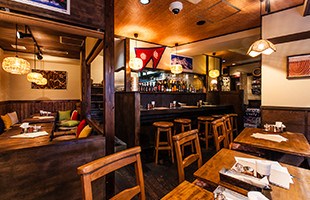
Phone: 03-6804-0576
- Address:
- 101, Sun City Towa Bldg., 4-2-6 Kamiuma, Setagaya-ku, Tokyo
- Open:
- [Monday - Wednesday, Friday - Sunday, National Holiday, Day before National Holiday] Lunch 11:30 am – 3:00 pm (L.O. 2:30 pm) / Dinner 6:00 pm – 11:00 pm (L.O. 10:30 pm)
- Closed:
- Thursday
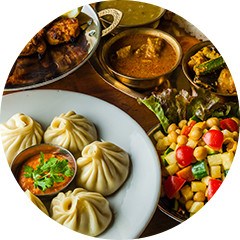 What is Nepalese cuisine?
What is Nepalese cuisine?
What is Nepalese cuisine?

The cuisine of Nepal, kingdom of the Himalayas, varies from region to region due to multi-ethnicity as well as the influence of India to the south and China and Tibet to the north. While the cuisine is commonly perceived as hot, its spiciness is generally moderate. Most dishes are relatively healthy and contain less oil than Indian cuisine.
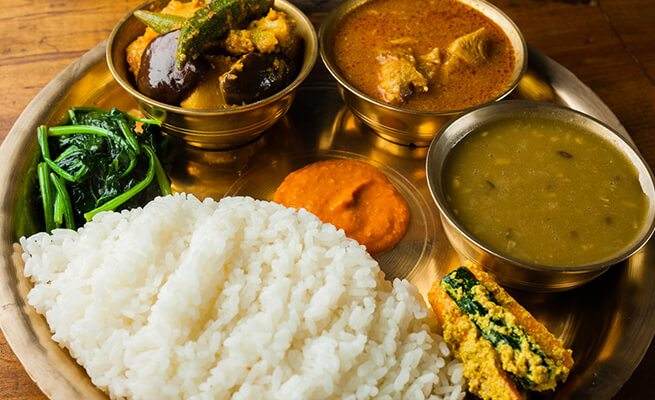
Non-vegetarian dal bhat (vegetarian is also available) is enjoyed by mixing the various side dishes in the rice and adding pickles as desired to adjust the spiciness.
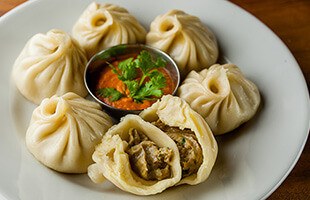
Momo steamed dumplings and a special sour tomato sauce scented with sesame oil.

No Nepalese meal is complete without lassi, the yogurty drink that perfectly matches dal bhat.
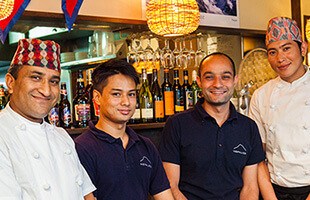
Owner Padamu and his staff are all Nepalese with candid, friendly dispositions that are part of the restaurant's appeal.

Near the entrance are various publications praising the restaurant's staff, atmosphere and cuisine.
Authentic Nepalese
In Japan, many restaurants serve both Indian and Nepalese cuisine, which tends to mingle and confuse the two in customers' minds. While similar in many ways, due to their historic neighboring influence, Nepalese cuisine has its own distinctive dishes and characteristics.
"In the past, many customers asked if we served naan," owner Debokota Padamu told us, "so I started serving dal bhat to expand people's awareness of Nepalese cuisine."
Dal bhat, the national dish of Nepal, has become one of Nepalico Komazawa's signature meals. It includes dal (lentil soup), bhat (rice), tarkari (side dishes) and achar (pickled vegetables) served on a brass plate.
Nepalese typically pour dal and tarkari on the rice and mix them while dining. A mouthful of this mixture delivers a deep yet mellow taste with just the right amount of spicy zest. Smiling brightly, Padamu informs us that "the recipes are light on the stomach, with mild flavors that suit Japanese palates."
He opened the Shibuya branch in 2010 and the Komazawa branch in 2014. The immense popularity of both establishments proves the appeal of authentic Nepalese cuisine in Tokyo.

Phone: 03-6804-0576
- Address:
- 101, Sun City Towa Bldg., 4-2-6 Kamiuma, Setagaya-ku, Tokyo
- Open:
- [Monday - Wednesday, Friday - Sunday, National Holiday, Day before National Holiday] Lunch 11:30 am – 3:00 pm (L.O. 2:30 pm) / Dinner 6:00 pm – 11:00 pm (L.O. 10:30 pm)
- Closed:
- Thursday
Nirvana New York Tokyo Midtownニルヴァーナ ニューヨーク 東京ミッドタウン
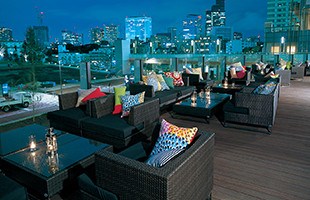
Phone: 03-5647-8305
- Address:
- 1F, Garden Terrace, Tokyo Midtown, 9-7-4 Akasaka, Minato-ku, Tokyo
- Open:
- [Weekdays] Lunch 11:00 am - 3:30 pm (L.O. 2:30 pm) [Saturday, Sunday, National Holiday] Lunch 11:00 am - 4:00 pm (L.O.3:00 pm) [Weekdays, Saturday] Dinner 5:00 pm - 0:00 am (L.O. 10:00 pm) [Sunday, National Holiday] Dinner 5:00 pm - 11:00 pm (L.O. 10:00 pm)
- Closed:
- When Tokyo Midtown closes
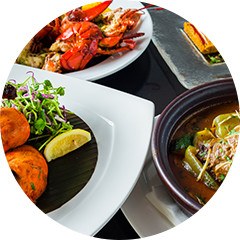 What is Indian cuisine?
What is Indian cuisine?
What is Indian cuisine?
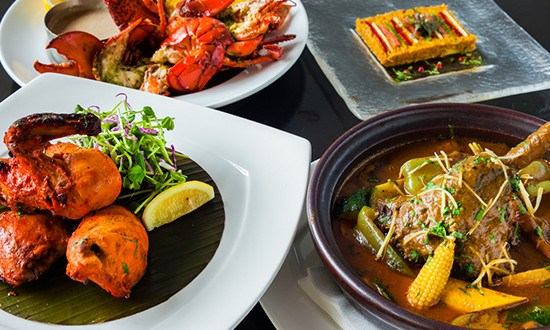
Indian cuisine may be perceived as spicy, but it varies widely throughout the nation. Many northern recipes are influenced by the Middle East and include dairy products. Southern dishes typically feature vegetables and beans. Western Goan cuisine reflects Portuguese colonial influence, and Mughlai cuisine enjoyed north and south originates from the courts of the Mughal Empire.
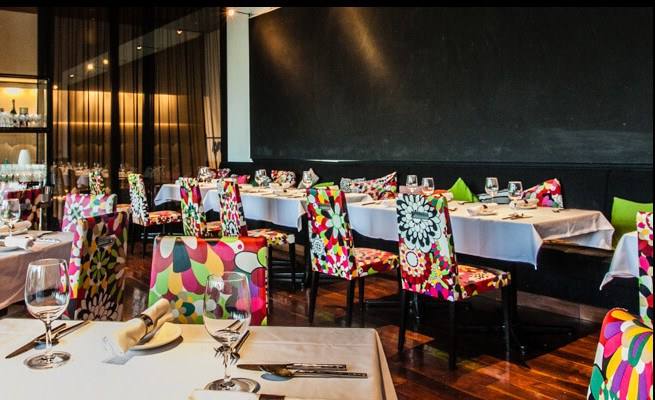
Marimekko, Missoni and other European brand fabrics lend colorful accents to an atmosphere that's casual in the daytime, but chic and mysterious in the evening.

Avocado snow crab tartare colorfully arranged with French finesse.
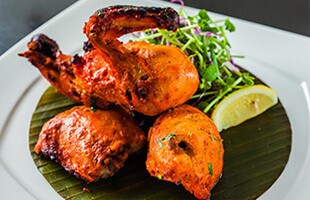
Tandoori chicken marinated in special masala sauce and baked to fragrant perfection in a tandoori oven.
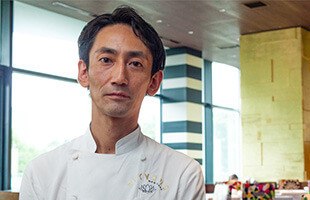
Chef Kosei Sugiyama distills the essence of international cuisine in his original Indian recipes.
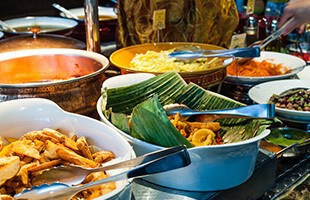
The buffet lunch includes tandoori chicken, 5 types of curry, various desserts and other delights.
Rebirth of a legend
Nirvana, the legendary Indian restaurant of 1970s New York fame, has been resurrected in Tokyo to the joy of connoisseurs. Its gorgeous views capture verdant Tokyo Midtown rather than Central Park, but its passionate pursuit of new gourmet possibilities continues with a wow factor elicited by unpredictable ingredients, flavors and arrangements.
Fresh regional ingredients from throughout Japan steal the show and "require no masking from spices that play a supporting role because of the quality of the main ingredients," explains chef Kosei Sugiyama.
From incomparably sweet and elastic lobster always boiled following the order to tandoori chicken made exceptionally tasty by use of Japanese jidori (free-range) chicken, the fresh, light flavors contrast with everyday Indian fare.
This primacy of main ingredients over spices extends to curry with a sour tomato taste and appetizers with vegetables harvested every morning in Miura. The cuisine is subtractive, focusing on main ingredients to bring out new facets of Indian cuisine.
Having never lost its luster, the innovation that once captured the hearts of New Yorkers has now taken center stage in Tokyo.

Phone: 03-5647-8305
- Address:
- 1F, Garden Terrace, Tokyo Midtown, 9-7-4 Akasaka, Minato-ku, Tokyo
- Open:
- [Weekdays] Lunch 11:00 am - 3:30 pm (L.O. 2:30 pm) [Saturday, Sunday, National Holiday] Lunch 11:00 am - 4:00 pm (L.O.3:00 pm) [Weekdays, Saturday] Dinner 5:00 pm - 0:00 am (L.O. 10:00 pm) [Sunday, National Holiday] Dinner 5:00 pm - 11:00 pm (L.O. 10:00 pm)
- Closed:
- When Tokyo Midtown closes
Celadonセラドン
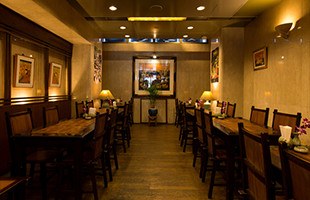
Phone: 03-5371-3223
- Address:
- 1F, VORT Hatagaya Bldg. (formerly known as GS Main Bldg.), 1-8-3 Hatagaya, Shibuya-ku, Tokyo
- Open:
- [Tuesday - Friday] Lunch 11:30 am – 2:30 pm (L.O. 2:15 pm) [Tuesday - Friday] Dinner 5:30 pm - 11:30 pm (L.O. 10:45 pm) [Saturday, Sunday, National Holiday] Dinner 4:30 pm - 11:30 pm (L.O. 10:45 pm)
- Closed:
- Monday
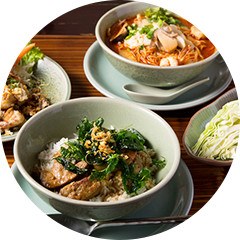 What is Thai cuisine?
What is Thai cuisine?
What is Thai cuisine?
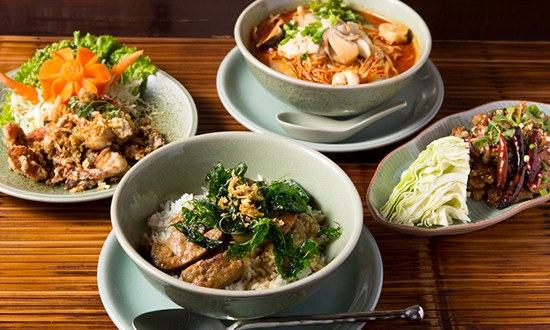
Thai cuisine varies by region and is characterized by complex flavors somewhat difficult to describe. Spices, seasoned vegetables and herbs deliver zesty tastes and aromas. Coconut milk and palm sugar add sweetness. And seasonings such as tamarind, nampura fish sauce and shrimp miso provide an additional a layer of richness and sourness.
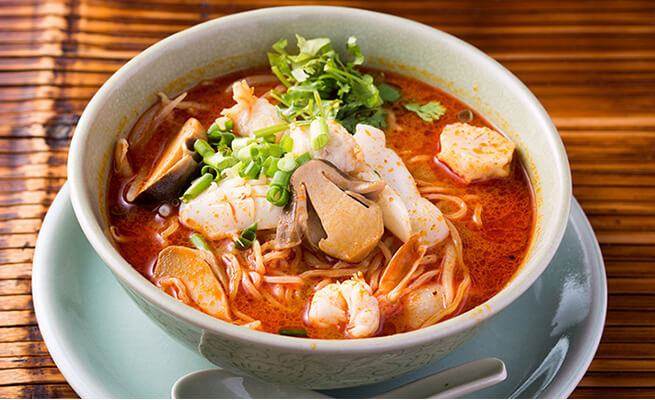
Flavorful and fragrant bami tom yam, a rich tom yam goong noodle soup with seafood and dried shrimp-based nahm prik pao seasoning.
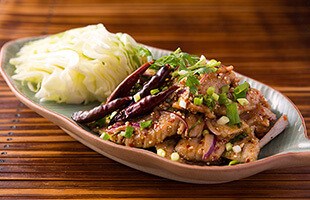
Nam tok stir-fried pork salad from Isan, the northeast region known for its spiciness.
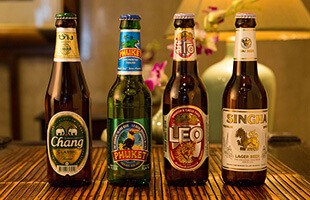
Thai beers include world-famous Singha and lesser-known Chang, Leo and Pukhet brands.

Mana Amonrattapun's welcoming smiles were cultivated by years of hotel receptionist experience.
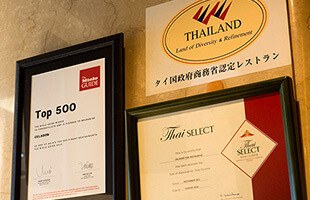
The coveted Thai Select certification at the entrance promises exclusive taste, atmosphere and service.
Certified Thai Select
Halfway between Hatagaya and Sasazuka stations on the first floor of an office building parallel to Koshu-Kaido route stands Celadon Thai restaurant. Guests are greeted at the entrance by a large sculpted Buddha head before passing into a dining room with teak and bamboo flooring, furnishings and paneling, as well as Thai paintings on the walls. Pale green celadon (greenware) lamps, vases and tableware lend a certain elegance to the Asian atmosphere.
Brimming with the distinctive ambience and hospitality of Thailand, Celadon is certified "Thai Select" by Thailand's Ministry of Commerce. This certification extends to the cuisine, which includes popular dishes from Bangkok, spicy food from Isan (northeast region) and diverse recipes from Chiang Mai (northern region).
The busy chef spent over 40 years single-mindedly refining his eclectic Thai culinary skills. "He uses nouvelle cuisine techniques within the boundaries of tradition," owner Hiroko Chiba tells us. But no tension is created by this expert balancing act. Guests enjoy warm, friendly service worthy of Thailand, which is renowned for its smiling inhabitants. Regular customers often request off-menu items and the homey atmosphere contributes to the restaurant's broad appeal.

Phone: 03-5371-3223
- Address:
- 1F, VORT Hatagaya Bldg. (formerly known as GS Main Bldg.), 1-8-3 Hatagaya, Shibuya-ku, Tokyo
- Open:
- [Tuesday - Friday] Lunch 11:30 am – 2:30 pm (L.O. 2:15 pm) [Tuesday - Friday] Dinner 5:30 pm - 11:30 pm (L.O. 10:45 pm) [Saturday, Sunday, National Holiday] Dinner 4:30 pm - 11:30 pm (L.O. 10:45 pm)
- Closed:
- Monday
*Articles are written based on information available at the time of publication.
More restaurants


